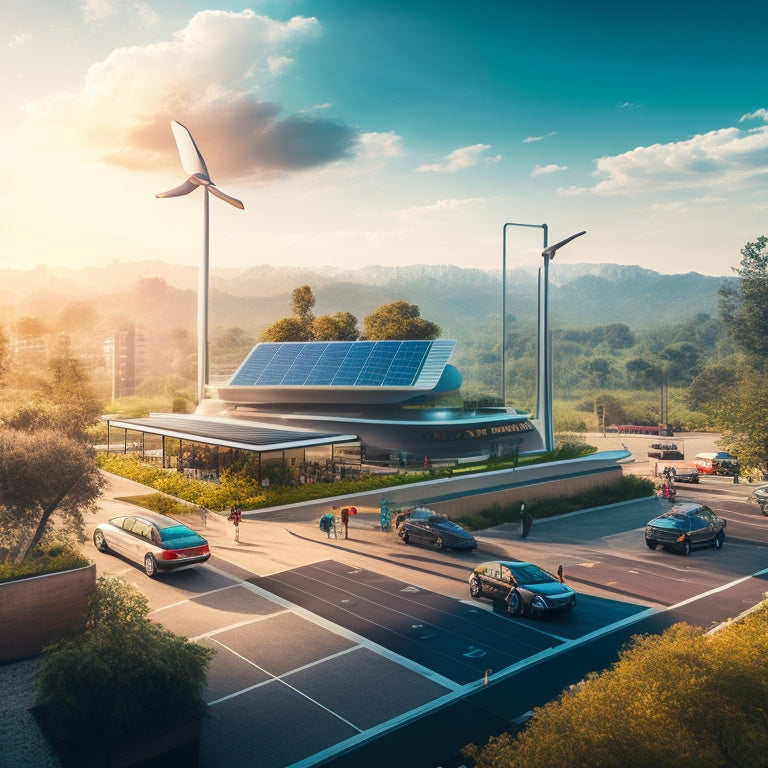
Haryana Sparks Electric Vehicle Revolution
Share
Haryana has introduced a all-encompassing policy to promote electric vehicles, aiming to reduce the state's carbon footprint. The policy includes subsidies and incentives, such as 15% rebates for hybrid vehicles and pure EVs, as well as exemptions from electricity duty for charging infrastructure. However, delays in implementation have hindered market growth and adoption. Uncertainty among dealers and buyers persists due to lack of clarity on hybrid vehicle classification and discounts. As the state aims to become a hub for electric vehicles, addressing these challenges is essential to achieving its green vision. Further exploration is needed to uncover the full potential of Haryana's electric vehicle revolution.
Key Takeaways
• Haryana's EV policy aims to promote electric vehicles, but delays in implementation have impacted market growth and adoption.
• The policy offers subsidies and incentives, including 15% rebates for hybrid vehicles and 100% rebate on motor tax and registration fees.
• Incentives for charging infrastructure, such as exemptions from electricity duty, are designed to create a robust network for widespread EV adoption.
• Clarity is needed on hybrid vehicle categorization, as unclear guidelines are causing confusion among dealers and buyers.
• Effective implementation of incentives and subsidies is hindered by policy delays, confusion, and uncertainty, impacting the EV revolution in Haryana.
Haryana EV Policy Implementation
The Haryana Electric Vehicle Policy, aimed at promoting the adoption of electric vehicles in the state, has faced delays in its implementation, with its original scheduled start date of July 7th having passed without execution.
This delay has significant implications for the policy's impact on the market, as it hinders the growth of the electric vehicle market in Haryana. The policy's implementation is vital for stimulating market growth and increasing the adoption of electric vehicles.
The delay has created uncertainty among dealers and buyers, affecting the policy's overall effectiveness. It is essential to expedite the implementation process to realize the policy's full potential and drive the electric vehicle revolution in Haryana.
Subsidies and Incentives Unveiled
Fifteen percent subsidies await hybrid vehicles under 40L and pure EVs between 15-40L, as outlined in the Haryana EV Policy. This government support is a significant step towards promoting the adoption of electric vehicles in the state.
The policy offers financial benefits, including a 100% rebate on motor tax and registration fees for electric 2-3 wheelers. Additionally, incentives are available for e-Rickshaws, electric vehicles below and above 10L, and imported EVs priced between 40-70L.
These subsidies and incentives are designed to encourage the uptake of eco-friendly vehicles, reducing the state's carbon footprint and contributing to a sustainable future.
Charging Infrastructure Boost
Haryana's electric vehicle revolution receives a significant boost with the policy's incentives for charging infrastructure, which includes exemption from paying electricity duty for EV manufacturing and battery units for 10 years. This move demonstrates the government's commitment to supporting infrastructure development, an essential aspect of promoting electric vehicles.
Charging operators will benefit from dedicated lines, special discounts, and lower electricity rates for charging EVs compared to normal rates. These incentives will be applicable for six months from the policy announcement, benefiting battery charging and swapping operators.
The focus is on creating a robust charging infrastructure to facilitate the widespread adoption of electric vehicles in Haryana. With government support, the state is poised to become a hub for electric vehicles, driving a sustainable transportation revolution.
Clarity on Hybrid Vehicles Needed
Unclear categorization of mild hybrids under the Haryana EV Policy is creating confusion among dealers and buyers, highlighting the need for clear guidelines on the application of discounts for electric vehicles and hybrid models.
The policy's lack of clarity on hybrid vehicle classification has led to uncertainty regarding the extension of discounts. Dealers are unsure about the classification of smart hybrids, and the Gazette released by the Haryana Government has not provided sufficient clarity.
Incentive clarity is essential to guarantee a smooth shift to electric and hybrid vehicles in Haryana. Clear guidelines on hybrid vehicle classification and incentive application are necessary to avoid confusion and facilitate the widespread adoption of eco-friendly vehicles in the state.
Challenges in Implementation Process
The implementation of the Haryana EV Policy has been hindered by challenges. One major issue is the confusion among dealers and buyers regarding notifications and discounts. This confusion has resulted in uncertainty in the execution of incentives and subsidies for electric vehicles in the state.
Some of the key challenges faced in the implementation process include:
-
Policy delays: The policy was supposed to be implemented on 7th July but experienced delays in its execution.
-
Confusion among dealers: Dealers are unclear on notifications and discounts as per the Gazette released by the Haryana Govt.
-
Lack of clarity on incentives: There is a lack of clarity on how discounts will be applied for electric vehicles and hybrid models.
- Uncertainty in subsidies: Dealers and buyers are uncertain about the upfront extension of discounts, leading to confusion and uncertainty.
Dealers Face Uncertainty Issues
Dealers in Haryana are struggling to navigate the uncertainty surrounding the implementation of the state's EV policy, which has led to confusion and hesitation among potential buyers. The lack of clear guidelines and awareness about the policy is hindering the effective implementation of incentives and subsidies for electric vehicles. Dealers are unclear about notifications and discounts as per the Gazette released by the Haryana Govt, leading to uncertainty issues.
| Dealer Concerns | Policy Understanding | Impact on Sales |
|---|---|---|
| Clarity on discounts | Lack of clear guidelines | Hesitation among buyers |
| Uncertainty on hybrid vehicles | Confusion among dealers | Delayed sales |
| Effective communication | Policy awareness | Increased sales |
| Clear guidelines | Smooth implementation | Boost in EV adoption |
Dealers require better communication and policy understanding to facilitate a smooth shift to electric vehicles in Haryana.
Implementation Roadblocks Ahead
As the Haryana Electric Vehicle Policy struggles to gain momentum, several implementation roadblocks have emerged, threatening to derail the state's ambitious plans to promote electric vehicles. The policy's slow execution has led to policy delays, causing uncertainty among dealers and buyers alike.
-
Lack of clarity on discount applications for electric vehicles and hybrid models is causing dealer confusion.
-
Uncertainty persists regarding the upfront extension of discounts by dealers, leading to buyer uncertainty.
-
Dealers are facing challenges in understanding the notification and offering discounts as per the Gazette.
- The absence of clear guidelines and awareness about the policy is hindering the effective implementation of incentives and subsidies.
These obstacles must be addressed to facilitate the successful implementation of the Haryana Electric Vehicle Policy and promote the adoption of electric vehicles in the state.
Frequently Asked Questions
Can I Avail of the EV Policy Benefits for My Existing Vehicle?
Opening the gates of sustainability, one vehicle at a time. Unfortunately, the EV policy benefits are not retroactive, so you cannot avail benefits for your existing vehicle; instead, consider Vehicle Inspection and potential EV Conversion to access incentives.
Are There Any Separate Incentives for Commercial Electric Vehicles?
Commercial electric vehicles, such as those used by Fleet Operators, benefit from additional incentives under the policy, including exemptions from motor vehicle tax and registration fees, promoting the adoption of Green Logistics in Haryana.
How Will the 15% Subsidy Be Calculated for Hybrid Vehicles?
Like a puzzle piece, the 15% subsidy for hybrid vehicles fits into the larger picture of the Haryana EV Policy. Calculated on the ex-showroom price, this subsidy is applicable to hybrid vehicles classified under the 15-40L range, meeting subsidy eligibility criteria.
Can I Install a Personal EV Charging Station in My Residence?
Yes, you can install a personal EV charging station in your residence, enjoying home installation benefits, including convenience, time-saving, and potential residential benefits like reduced electricity rates for EV owners.
Will the Policy Be Revised Based on Feedback From Dealers and Buyers?
The policy's revision is likely, as the government responds to feedback from dealers and buyers, incorporating stakeholder input into the revision process, potentially leading to a policy overhaul that addresses existing ambiguities and implementation challenges.
Related Posts
-

3 Ways Wind Power Boosts Home Value
Living near a wind farm can enhance your property's value in three significant ways. To begin with, proximity to wind...
-

Why Vertical Gardens Reduce Home Energy Consumption
By incorporating a vertical garden into your home design, you'll reduce energy consumption through natural insulation...
-

7 Best Solar Panel Upkeep Apps for Homeowners
You can optimize your solar panel's energy output and efficiency by up to 20% with regular maintenance, which is wher...


